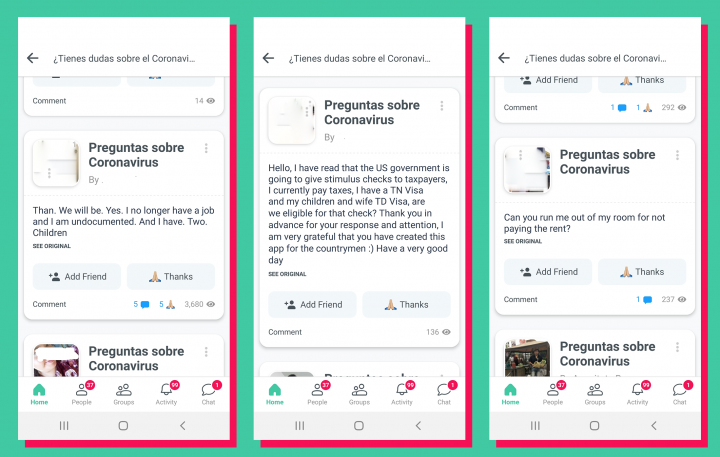Neel, a 24 year old from Gujarat, India, who is in the U.S. for school, got an internship in Silicon Valley this spring. He needed help finding a more affordable place to stay, and a friend suggested Homeis, a platform for immigrants that’s a bit like NextDoor. Homeis is organized by “community,” so when Neel opens the app, he sees posts from other nearby Indian immigrants.
He found housing through Homeis in January and started his internship in February, but then came the COVID-19 pandemic. His internship was halted, and he wasn’t sure what else his F1 visa, which is contingent on him being a full-time student, allowed him to do for work in the meantime. He asked around and even posed the question to Quora, but no one had any legal expertise to help. So he turned to Homeis again, and made a post asking what jobs he could do while maintaining his full-time student status.
“I got a personal message from the Homeis community manager, who told me, ‘We have organized a session with an immigration attorney, and we will be addressing your question to him,'” Neel says. That lawyer explained that, despite a friend’s suggestion, multilevel marketing wasn’t an option because of the time requirements necessary that would conflict with his full-time student status. Investing in stock, if not turned into a full job like day trading, was allowed. “That was a big help for me,” Neel says. “I got free legal advice from an immigration attorney through Homeis.”
There is a lot of confusion about what the coronavirus pandemic means for people and their livelihoods across America, and it can be even harder to get that information as an immigrant—especially with language barriers, the complications of visas, and amid fears for undocumented people that seeking coronavirus testing or treatment could leave them vulnerable to arrest by immigration authorities. Ran Harnevo, who founded Homeis in 2017, says they are able to reach these immigrant communities. He couldn’t have expected how they would turn to the app in light of COVID-19, but he says he’s ready to respond to this need.

“The idea was to digitize immigrant communities across the country, and then globally,” says Harnevo, who moved to the U.S. from Israel 11 years ago. “They are so tight and so helpful to one another, but everything is offline.” Homeis has launched five communities across the country, meaning iterations of the platform geared specifically to Indian, Mexican, French-speaking African, Israeli, and French immigrants. Users in different communities see their Homeis pages in their own language (the Indian community is the only one in English), and each community has its own Community Manager, from that immigrant group. In the past, users have posted to Homeis to find or offer jobs and housing, or to just connect and make new friends.
But since the coronavirus pandemic hit the U.S., Harnevo says he’s seen traffic skyrocket. In March, Homeis saw 350,000 active users, a 300% average growth in daily active usage since the pandemic began. “Homeis became the de facto platform for hundreds of thousands [of immigrants],” he says, helping inform immigrants who often don’t have great English skills, and who have “very dedicated needs that are not being treated right now.” Think of people waiting for visa extensions, or undocumented immigrants who don’t know their rights around healthcare. They don’t know if they’re covered by stimulus efforts, even as they’re often the first to lose their jobs.
“As a company, we have changed all of our modus operandi,” Harnevo says. He’s creating volunteer groups around the U.S. to help people in need, and sending push notifications trying to explain what’s going on. He’s contacting experts in small business and immigration law, and even psychologists, to do Zoom meetings with communities on the platform. Someone from the Israeli Council of New York went live on the app last week to do a Q&A. The head of Latino communities, which is currently only serving Mexican immigrants (it has just been live for two months, and Homeis plans to include other Latinx communities soon), received 4,000 direct messages from people asking for help or clarification. He’s seeing users support each other in new ways, too—for Passover, a group of Israeli users in New York have organized a Zoom Seder, and also coordinated a network of Israelis ordering food from Israeli restaurants in the city to bolster their business.
“I’m running against the clock to launch more and more communities, because I feel it’s needed,” Harnevo says. The difficulty, though, is in the language. Because most of the communities are in immigrants’ native languages, rolling them out can be harder, but he says that feature is vital: “Language here is a very big part of the feeling of safety that people need right now. We’re giving trust and we’re giving a safe space.”
Homeis is a startup, and Harnevo is a bit worried about how much they are spending to roll out these new services, though he says they were fortunate to have raised $12 million last August. The most important thing to him right now, though, is meeting this new need, and he wants nonprofit and immigrant organizations to join that effort on the Homeis platform, too. “Our mission statement is to build a better internet for immigrants,” he says. “I really think the internet is broken for immigrants. There’s a lot of language barriers, a lack of trust, especially in times where they don’t feel beloved—the Mexican community is a community that feels under attack already—and our goal is to give them all the tools right now to find jobs, to find housing, to find the right information, and most of all to help them help each other, because we’re not inventing a new behavior.”
Recognize your brand’s excellence by applying to this year’s Brands That Matter Awards before the early-rate deadline, May 3.
